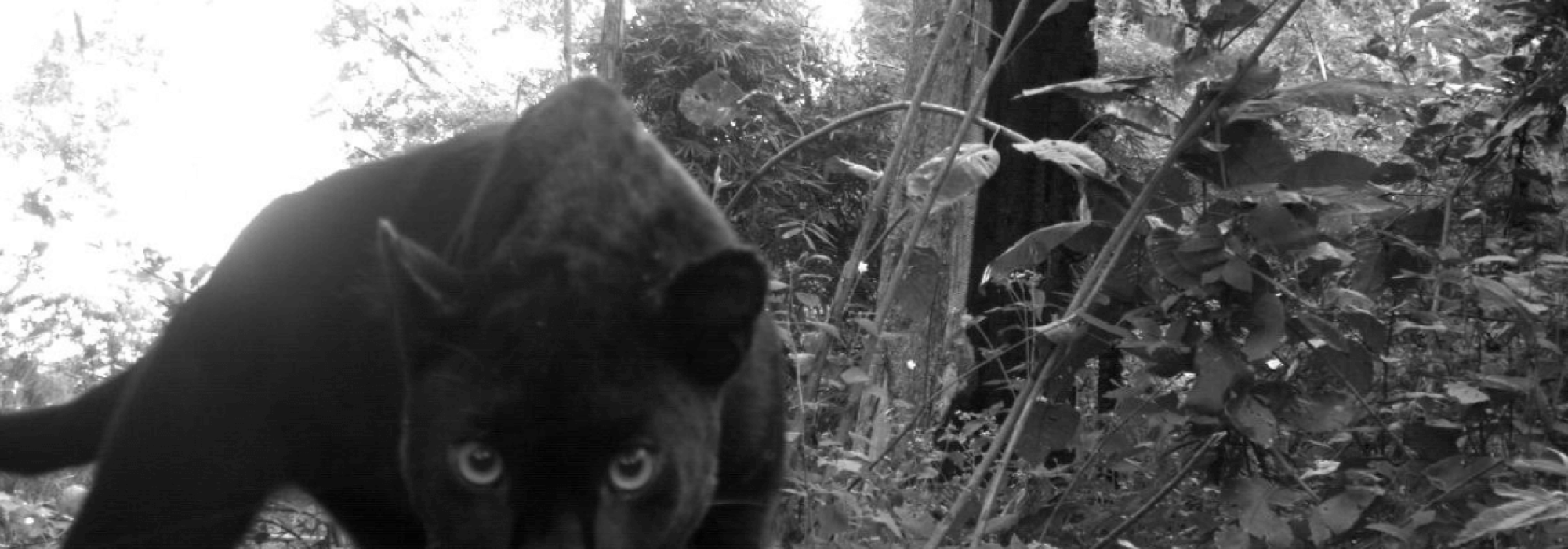Lorem ipsum dolor sit amet, consectetur adipiscing elit. Ut elit tellus, luctus nec ullamcorper mattis, pulvinar dapibus leo.


Stephanie Manka, Ph.D. is a wildlife biologist with 20 years of experience in mammal ecology and conservation, education, and outreach. Read her story to find out how she went from the daughter of a jeweler to a Ph.D. in wildlife biology.
I’m a wildlife biologist (since 2003) who has been part of a world-wide camera trapping project for the past six years with a strong focus in North Carolina. One of the most common questions, or rather statements, I get is about spotting black panthers in the eastern United States. But what exactly is a black panther? Do black panthers really exist? And is it possible that they are in the United States?
There’s a lot of misinformation about these animals, so let’s clear up some misconceptions.
Bagheera, the black panther from the Jungle Book, is one of my favorite Disney characters, but the term black panther is not quite right. The black panther is not a separate animal species. Rather, “black panther” is a blanket term for any member of the big cats with a black coat.
There’s a lot of misinformation about these animals, so let’s clear up some misconceptions.
The black coat is caused by a gene that produces a dark pigment. Mammals with this mutation are known as melanistic and this can occur amongst many different species outside of the big cats.
Black panthers technically could refer to any species of big cat that is black, but largely, if not completely, refer to melanistic jaguars (Panthera onca) or melanistic leopards (Panther pardus). When you look at these black big cats up close and with enough bright light, you’ll see spots within the dark fur.
Black panthers technically could refer to any species of big cat that is black, but largely, if not completely, refer to melanistic jaguars (Panthera onca) or melanistic leopards (Panther pardus). When you look at these black big cats up close and with enough bright light, you’ll see spots within the dark fur.
Photos of melanistic leopards. The infrared camera flash in the photo on the right makes the spots more apparent.
Black leopards seem to be more common than black jaguars, at least in the regions that we have camera traps. In our eMammal camera trap database, we have yet to have a photo of black jaguars, but have captured quite a few of black leopards in Thailand. This is especially interesting considering that melanism is recessive in leopards, but dominant in jaguars.
As black panthers are really melanistic leopards or jaguars, they live where these two different species live. Jaguars are found in South and central America, whereas leopards are found throughout Africa and Asia.
The panther is a real species and it is used to describe mountain lions, which live in North America (although I rarely hear people refer to them as panthers except for the Florida panther). The most common words used for this species (Puma concolor) are puma, cougar, or mountain lion, and there are many others that might be locally common.
As mentioned above, panthers (AKA mountain lions AKA pumas AKA cougars) live in North America, but only in the west. When I was doing my Ph.D. in Missouri up until 2012, they started moving into Missouri, but there was still not a confirmed breeding population at the time.
As mentioned above, panthers (AKA mountain lions AKA pumas AKA cougars) live in North America, but only in the west. When I was doing my Ph.D. in Missouri up until 2012, they started moving into Missouri, but there was still not a confirmed breeding population at the time.
Powered by RedCircle
However, you do hear people use the word panther when referring to the Florida panther. The Florida panther (Puma concolor coryi) is always called a panther, but in actuality, it is a subspecies of mountain lion. In fact, when Florida panthers were suffering from inbreeding due to few individuals, the government brought in mountain lions from Texas to help restore their genetic diversity.
All black panthers are black leopards or black jaguars. There are pseudo-melanistic tigers, but they still have stripes and you can see white in between the stripes, so they don’t look solid black like melanistic jaguars or leopards.
Given that leopards and tigers do not live in the United States (at least in the wild, they are privately owned in zoos or even by citizens), there are not black panthers of these species in the US.
Historically jaguars were found in the United States, but there are VERY few spotted and only in southern Arizona, today. In the past three decades, only eight individuals have been identified.
While there are no leopards and very few jaguars in the US, could there be any melanistic cougars? Cougars (AKA mountain lions, pumas, Florida panther) do live in the western United States and Florida, therefore, it makes sense that there could be a melanistic cougar.
However, over the course of history, there has never been a confirmed or documented case of a black cougar. Cougars have been hunted (and still are) for a very long time, so if there was one, there would likely be at least one specimen in museums. Over the course of history, since Europeans arrived, there has never been a confirmed or documented case.
Bobcats, a much smaller species of wild cat in the United States can be melanistic too, but this is extremely rare. There have only a dozen or so reported sightings across all of North America and because these cats are so MUCH smaller, they would look more like a house cat than a black panther. The also lack the long tail that a melanistic jaguar, leopard, or cougar would have.
Without any documented evidence (e.g. photos, kills from hunts), it makes it extremely unlikely that your friend saw a melanistic cougar. Outside of Florida, cougars are extirpated (locally extinct) from the eastern United States and sightings are reported all of the time to state game agencies. These photos of reported cougars (not melanistic ones), when reviewed by experts, turn out to be misidentified bobcats, deer, and dogs. When people see what they think is a black panther, it is probably misidentified dogs and black bears, and possibly deer depending on lighting.
It is technically possible for someone to see a real black panther in the United States, but this would either be a captive melanistic jaguar or leopard that escaped from a zoo or other private facility (super rare!) or the VERY first evidence of a melanistic cougar. Either way, there would eventually be documentation of the animal on photos by people or camera trap, as the jaguars in Arizona have been documented.
In fact, there are not even mountain lions in the eastern United States (outside of Florida panthers). There was a male that dispersed from the west to Connecticut, but this was not a mountain lion from a breeding population in the east. In other words this male traveled east, there are no populations with breeding females. We’ve run thousands of camera traps from Florida to New York with no photographic evidence.
If you truly believe you saw something that resembles a black panther or even a mountain lion in the eastern US, the best way to document it is through the use of camera traps. Because we cannot trust people’s species identifications on sight alone, a photo is the only way to confirm presence. Camera traps are also a fantastic way to connect to nature, so even if you are not trying to photograph a black panther or mountain lion, you will capture many other amazing animals
All camera trap photos were taken by the eMammal project.
Love this post? Share it with friends!
© All rights reserved 2024
I understand that inbox can be a lot and I respect your decision. If there’s anything you’d like to share or discuss with me in the future, don’t hesitate to get in touch.
We need the email you signed up with.
You have successfully joined our subscriber list.
I understand that inbox can be a lot and I respect your decision. If there’s anything you’d like to share or discuss with me in the future, don’t hesitate to get in touch.
We need the email you signed up with.
You have successfully joined our subscriber list.
Before we say our goodbye, I want to remind you that you have been an essential part of my journey. If there’s anything you’d like to share or discuss with me in the future, don’t hesitate to get in touch.
We need the email you signed up with.
You have successfully joined our subscriber list.

And get the 100+ Job Titles .PDF FREE!
Fill in the form below to be the FIRST notified once we open up our doors
Free Download
GIVE IT TO ME